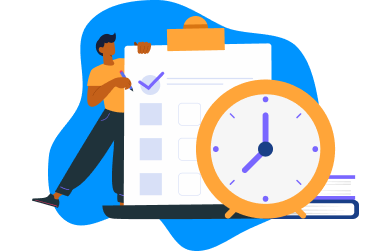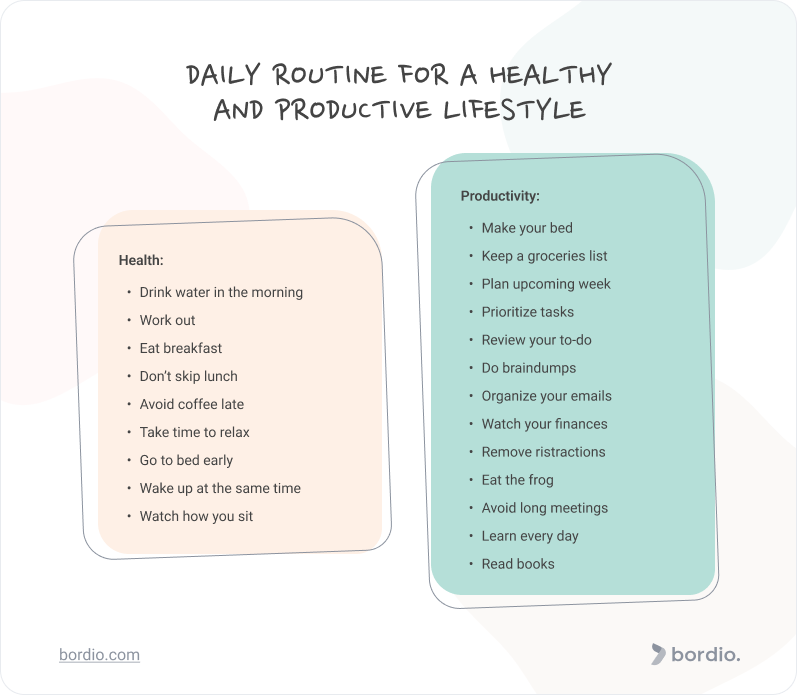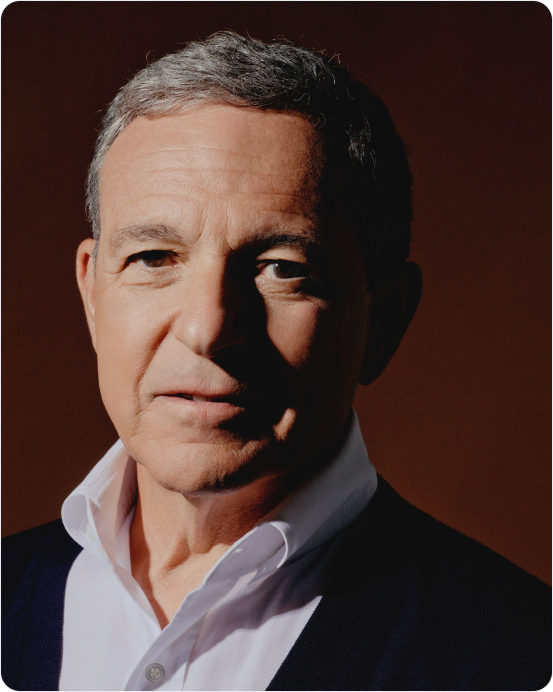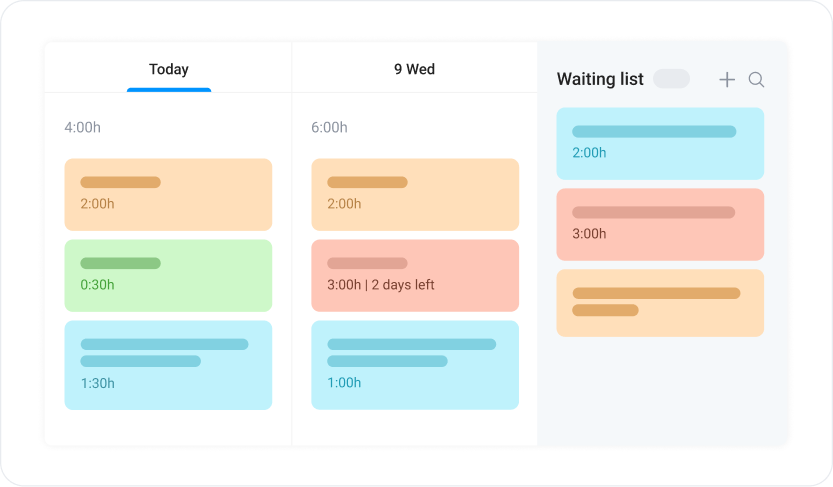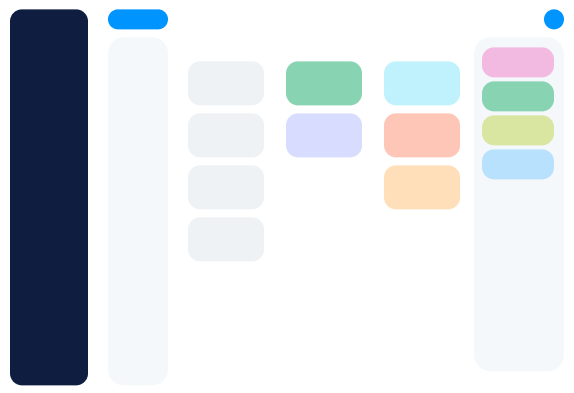Things that we do everyday shape who we become. That’s why routines and good habits are so important and powerful. We can dream and plan about healthier habits and better routines all day long, but unless we act on them, those better versions of ourselves remain unattainable.
While it is hardly a secret to anyone that good routines lead to healthier and more productive lives, we often fail to follow them. A big part of the reason for that is because a lot of healthy and smart choices require effort and, sometimes, sacrifice.
With today’s article, we hope to not only provide you with plenty of examples and ideas of daily routines that you can get inspired by, but also show you how you can stick to them with minimal difficulties and how to fit a daily routine into your life using online planning.
Why do I need a daily routine?
If you’ve lived your entire life without having a specific routine that you follow daily, the natural question that you might have is whether you need a routine at all.
That’s a fair question. And with social media, we now see thousands of inspiring videos and images of people following their elaborate daily routines which can be hard to squeeze into a normal person’s daily life.
However, what many of us don’t realize is that we already have a daily routine, whether we acknowledge it or not. And more often than not, such unacknowledged routines are a bit far from what we would choose if we thought about it.
A routine is basically a set of habits that we have and do every day. If you are struggling with poor planning, missed deadlines, drinking three black coffees instead of breakfast, and ordering greasy takeaway after work – those are all habits that together become your routine.
So the questions should rather be not “do I need a routine” because you have it either way. We should ask ourselves, what kind of routines do we want to shape our lives. Do we want to be productive, healthy, and happy? Or do we want to keep on doing what we’re doing and not make progress with our goals and dreams?
What a good daily routine can do for you
Now that we’ve established that everyone has a morning routine or a daily routine of some sort, here are the benefits that a good daily routine has to offer:
- Feeling better and being less stressed
- Prioritizing what’s important.
- Accomplishing more throughout the day
- Progressing with our goals faster
- Leading a healthier lifestyle
- Finding time for hobbies and relaxation
- Living a fulfilling life
Daily routines of highly successful people
Here are the examples of daily routines of people you most likely know and look up to.
Tip: For more inspirational content, check out Bordio’s expert article on how successful people are planning their days and check out Bordio’s electronic planners.
Daily routine of Sheryl Sandberg
Sheryl Sandberg, the COO at Meta and a Google executive in the past, has written a book (Lean In: Women, Work, and the Will to Lead) in which she shared her daily routine.
Like many successful people, Sheryl wakes up around 5:30 am, drops her kids at school, and arrives at the office around 7 am. As a COO, a big part of Sheryl’s working day is dedicated to meetings that keep her daily planner packed. And she keeps a notebook with her at all times to write down notes and key points from the discussions. The evenings are usually spent with a book or a favorite TV show, followed by going to sleep at 9:30 pm.
Daily routine of Arnold Schwarzenegger
Arnold’s daily routine naturally included a lot of working out during his bodybuilding career, followed by acting and politics.
However, the interesting part of the routine, in our opinion, is how Arnold and his roommate used to go about their shared apartment when they were young. They’ve kept their living space immaculately clean, vacuuming several times a week, always washing their dishes right away, and making their beds. Looks like such a strict routine is what helped them stay focused on their bodybuilding careers and achieve amazing results.
Daily routine of Alexandria Ocasio-Cortez
Alexandria has become a household name, making her political views stand out and fighting for justice where others gave up.
Alexandria’s day starts at 7-8 am with a 5-minute break of drinking water and clearing up her mind, followed by breakfast. On her best days (outside of campaigning), Ocasio-Cortez practices yoga 3 to 4 times a week, follows a healthy diet (such as salmon and rice for dinner), and reads avidly.
Daily routine of Bob Iger
Bob Iger was the CEO of Disney, one of the most recognized brands in the world.
Iger wakes up as early as 4:15 am and only picks up his phone after he’s done with the workout. Iger calls this behavior “firewall” and claims it helps him get ready for the day. Using a phone early in the morning creates distractions and ruins clarity and focus.
Ideas of daily routines to follow for a healthy lifestyle
A healthy daily routine looks different for different people. We’ve prepared a list of recommendations and suggestions to get you inspired. However, please always consider your circumstances and lifestyle first. It would make no good if you try to fit in the habits that are not close to your heart or are extremely difficult to implement.
Create your own personalized daily routine that works for you.
Drink water when you wake up
Drink at least a glass of water after you wake up. Add a bit of lemon, mint, or ginger to add more taste if you struggle with just drinking water. A glass of water in the morning helps your body wake up and kick-start internal processes. Plus, you instantly feel better after it because your body gets dehydrated over the night. Plus, remember to drink water throughout the day.
Adults usually require 1,5-2 liters of water per day, but that would vary depending on your age, weight, height, and health. Sometimes too much water is bad though, for example for blood pressure and headaches, so consult your doctors on what the norm is for you. And by the way, coffee and soft drinks don’t count as water, but some foods are a good water source, so you might not need to go for 8 glasses of water a day.
Work out in the morning
In the morning, set yourself the task of exercising in your daily task tracker. Even the shortest exercising session in the morning will boost your energy, improve circulation and lymphatic function, and strengthen your physical health. Aim to do a quick workout every morning. Make it 10 minutes if you can’t afford more at the moment, but try to keep it regular.
Also, remember to move during the day. Stand up at least once an hour if you work at your desk, do quick stretches or walk around the block.
Try to work on a standing desk if you have access to it or be creative and use kitchen counters and other higher surfaces to do the work. Tim Cook is among those who choose morning exercising, and he aims at doing one hour every day before work to keep his stress levels low.
Start your day with a good breakfast
Not everyone is ready to eat first thing in the morning, but if you’ve woken up, had a glass of water, and then exercised for a bit, by the time you get ready, you will definitely feel a bit hungry and will be able to eat something healthy. With breakfast, aim for healthier options that are full of nutrients and vitamins.
Try to skip greasy fried bacon or pastry overload, and go for eggs, nuts, or fruit instead. Avocado toasts with salmon or tuna would also be a good choice.
You might be used to skipping breakfast for years and adapting to those eating habits, so you might think you don’t need breakfast at all. But in fact, healthy food in the morning gives our bodies the energy to carry on and work hard during the day. Try having good breakfasts every day for a couple of weeks and see if you feel any difference in your productivity and energy levels throughout the day.
Also, notice if your eating habits change too. Often, when we skip breakfast, we end up opting for unhealthy options later, so having a proper start to the day can lead to a healthier diet and overall health. Isn’t it something we all want and dream of?
Don’t skip lunch
Just because you’ve started eating breakfast, does not mean that you can skip lunch now. Lunch is just as important because it fuels us midday when we’ve already done a lot and feel a bit tired and unmotivated, so make sure you have it scheduled every day in your digital week planner, so nothing else gets in the way.
A good lunch can do wonders and bring us back to life, but it needs to be healthy to do that. Notice how after you’ve consumed a burger and a large portion of french fries with a half-liter soft drink, you suddenly feel sleepy? That’s a normal bodily reaction after a heavy meal.
So, if you want to stay active and productive after lunch, go for nutritious but lighter options, such as lean meat or fish, salads, or soups. Don’t eat too much but also don’t grab tiny snacks that would only last for an hour. You can also free up your schedule in your task organizer to prepare breakfast and lunch preparations for the next day.
Avoid caffeinated drinks in the afternoon
There are mixed reports about coffee and its influence on our bodies. Feels like every 6 months scientists come up with opposite conclusions! However, what all of them agree on, is that it takes amazingly many hours for caffeine to leave our bodies. Instead of invigorating yourself with coffee, do some proper time planning.
Some say it takes about 12 to 16 hours in total. So imagine you drink a cup of coffee somewhere around 3 pm. It means that you will still be caffeinated for most of the night! And while contrary to popular belief, most people can fall asleep after they drink coffee, the quality of sleep drops, so you wake up more tired than you would be without the coffee.
Allocate time for relaxation
Resting and relaxing can be portrayed as being lazy and unproductive. While we strongly disagree with that notion, it prevails in many countries and societies. And such a mindset is literally killing us, and we are not being dramatic here.
Those who don’t rest have higher risks of mental and physical diseases, and they burn out much more often compared to their colleagues who take time off and are able to relax fully. Think of activities that you enjoy that also have a relaxing effect, such as going on long walks or reading, and make it a priority to fit them into every day.
Go to sleep early
Think back to those past few weeks – what have you been doing for a couple of hours before going to bed? Most likely, you were involved in some kind of revenge bedtime procrastination. And we get how frustrating it may be to not have the time for your favorite activities during the day, but putting off sleep is not the answer.
Good night’s sleep is crucial for your well-being. Proper sleep keeps us healthy and gives us more energy to work on important tasks.
Also, avoid using devices at least an hour before going to bed. Read a book, meditate, or chat with your family members instead.
The early bird gets the worm!
Wake up at the same time
Yes, aim to wake up at the same time every day and make it a part of your morning routine, even on the weekend.
As you do that for a few weeks, your sleep habits will form, and your body will get used to the new schedule. To manage your wake-up routine effectively, consider using a planner app for iPad to plan your sleeping schedule and morning activities. A daily planner can help you organize your day, from breakfast preparation to your morning workout, ensuring you stay on track and maintain consistency.
And don’t think that you must wake up at 5 am every day because that’s what people who inspire you do. Everyone has a different lifestyle and needs, so if you opt to wake up every day at 9 am that’s also fine (if you don’t go to bed at 2 or 3 am, of course).
Warren Buffet is among those who wake up at the same time every day. Mr. Buffet typically starts his day at 6:45 am and gets 8 hours of sleep.
Also, avoid snoozing your alarm clock! Interrupted sleep will only make you feel worse.
Wash your sheets once a week
You wouldn’t wear the same t-shirt for 10 days, would you? Yet many of us are completely okay with sleeping for 7 to 9 hours a day with the same sheets for up to 14 days. Bedding collects a lot of dust, sweat, dirt from animals, and many other unpleasant things. All that can easily make you sick or cause an allergic reaction, so try not to use the same sheets for more than a week.
Watch how you sit
If you are in a privileged position of doing your work mostly sitting, make sure you are not hurting your body with bad sitting positions. Sitting for too long with bad posture leads to poor blood circulation, sore muscles, and even weight gain! So, next time you sit at your desk, do your best to sit straight and move every once in a while.
And if you blame your bad posture on your apartment that is not equipped for work, read our article on organizing a home office that will make you feel good.
Revisit your take on happy hours
Alcohol consumption is not healthy, nor does it help us become the best version of ourselves. If your co-workers or friends invite you for happy hour you want to spend time with them, opt for non-alcoholic drinks (there are tons of delicious virgin cocktails out there these days) or simply grab something to eat.
Ideas of daily routines to follow for a productive lifestyle
Health and productivity go hand in hand. Here are a few things you can integrate into your productive routine.
Make your bed after you wake up
Let this little ritual be a transition between sleeping and being awake, symbolizing the start of the new day.
Do quick clean-ups in the evening before you start preparing for sleep
Spend 5-15 minutes on putting things away, wiping down the surfaces, and other little bits. It’s a completely different feeling to be waking up in a clean space, plus you will save yourself lots of cleaning time on the weekends if you keep your house in order throughout the week.
Keep a note with the groceries list on your phone
Create a note in your free task planner with your usual suspects, such as veggies and fruit, meat and fish, bread, pasta, and anything else that you purchase regularly. If you see that you’re running low on something, add it to the list, so next time you go grocery shopping, you don’t forget the very bits you need the most.
Make it a habit to have a quick fridge and pantry check before you leave the house. Do that, and you’ll be able to avoid the temptation just to order something with UberEats as you come home only to realize there’s no food for you to cook with.
Plan the upcoming week and day
Our favorite quote by Brian Tracy says that “every minute in planning saves you 10 minutes in execution”. We couldn’t agree more! There’s nothing worse than waking up, getting ready, going to work, and then realizing that you have no idea what to start with.
It happens to the best of us, and what we end up doing usually is scrolling through emails, going for yet another cup of coffee, or engaging in low-priority tasks that help us feel productive but add no significant value.
If you take the time to plan your week and then plan every day too, you will be less likely to procrastinate. When you have a solid list of things that need to be done, you can get right to it without any delays.
Try some simple weekly schedule maker or use the Bordio’s free online calendar planner for planning your month, week, and day. Log all unscheduled tasks in the Waiting list and review it every week to see if you can now allocate time for some of them.
Get Bordio’s printed calendars to put up by your desk. Use them to mark the most important deadlines and events, but also track your habits.
Prioritize tasks
Just making a list of tasks for the week in your online to-do list is not enough, especially if you have lots of them. That’s why you need to prioritize them to guarantee that the most important and urgent stuff gets done. And to ensure that you feel accomplished by the end of the day, and progress with your goals.
Tip: Read our task prioritization guide for more tips on working with tasks.
Review your to-do list at the end of the day
See how much you were able to accomplish, what is still to be done, and if any of the tasks should be scheduled again for tomorrow, delegated, or pushed back.
If you feel the desire to skip checking your to-do on the days when you weren’t most productive – fight that urge! It’s very important to be honest with yourself and learn to plan better and work on tasks more effectively. A good starting point for that is to review your to-dos every day.
Practice brain dumps
Brain dump means writing down everything that worries you and keeps your mind busy.
The idea is that once you have it all on paper, even the smallest tasks and ideas, your brain gets to relax, as it is no longer pressured to remember them all. Once you have the brain dump results in front of you, you can sort through those tasks/ideas/issues and start working on them. Use Bordio’s Waiting List for your next brain dump session, and then conveniently move items from there to the calendar.
Tip: David Allen coined the term Mind Sweet in his best-selling book Getting Things Done. Mind Sweep is a more elaborate and structured alternative to brain dumps. Check out the expert guide on Mind Sweeps that we’ve prepared to learn more.
Organize your emails
Spend 20 minutes on organizing your mailbox, setting filters and rules, and prioritizing your incoming emails. This will help you not get overwhelmed with lots of items in your inbox, plus you’ll be able to schedule time blocks to deal with certain types of emails, such as client change requests or reports from your team.
We did a separate article on organizing your gmail, so make sure you check it out if you use Google’s mailbox.
Avoid checking your emails all the time
Emails are distracting, and most of them are not even important or helpful. Email checking gives us a false sense of achievement, when in fact, we’re usually not doing anything productive with them.
Resort to check your mailbox 2 or 3 times a day maximum, and never start your day by checking emails because they’ll consume all your time and waste those first precious hours of the day when most of us are at peak efficiency and productivity.
Stay on track with your finances
It can be intimidating to have an honest look at and review one’s finances. However, it needs to be done! There is nothing quite as empowering as being in full control of your financial life.
Learn to look at your bank’s balance regularly, analyze your key expense groups, see where you’re overspending, and try to optimize it. Create sinking funds for expenses that you know you’ll need to pay, such as car insurance and Christmas gifts, work on building an emergency fund and try to grow it to at least 3 months worth of your spending. Explore your investment options and consider additional contributions to your pension fund.
Remove distractions
Create a workspace that encourages you to do your best. Figure out what the sources of distraction are and remove them completely or minimize their negative effects. For example, you can’t turn off and put away your mobile phone for an entire 8-hour work day, we get it. It’s hardly realistic for anyone these days.
Instead, put it in DND mode for periods of time when you are planning to do focused work.
Tip: Let your closest circle know about this new habit so that they don’t worry if they fail to reach you for an hour.
Eat the frog
Eating the frog means tackling your most dreaded task of the day early on.
The term is coined by Brian Tracy in his homonymous book. Brian is a renowned expert and productivity guru. You can read more about his and other expert books in our best productivity books guide.
Eating the frog is not for everyone, but it can do a lot of good. The idea is that this one task that we hate even thinking about spoils our entire day, as we dread working on it. So instead, if we eat this frog first thing in the morning, we get a huge boost and feel accomplished and relieved, leading to a happier and more productive day.
Say No more often
Whether the incoming request is reasonable or not, learn to say no to them if you honestly can’t fit them in your schedule without giving up something else of value to you. More often than not, people will ask us for random things and be completely okay if we say no. Don’t let those careless asks burden you and ruin your day.
Avoid long meetings
The amount of hours that we spend sitting in meetings that generate little value is astonishing. And if you have 3-4 meetings scattered around the day – you might as well consider it wasted because you can’t really do deep work just before the meeting, and you also need time to refocus and regroup after the meeting is over.
Not all meetings are bad, but all of them can be made better. Work on making your meetings shorter, and to the point, and avoid inviting everyone just in case. Best to keep it to the small group of people who are really involved in the topic and will be making the decisions.
If you are scheduling the meeting, try to do it 45 minutes instead of one hour, or 25 minutes instead of half an hour. Stick to the timing and finish it when the time is off, even if the discussion is still going. It can seem harsh, but you have to do it if you want to build discipline and respect for timing among your colleagues and yourself.
Tip: Do you attend lots of virtual meetings? Use our Zoom meeting ice breakers to make them a bit more fun. After all, only teams who are comfortable around one another achieve great results. I would also like to mention that it will be useful to use tools for managing remote employees.
Learn every day
Learning is a beautiful thing that makes us smarter, broadens our views, and allows us to stay competitive in the professional world.
Also, learning is good for our brains. Remembering something new keeps it healthy and lowers the risk of diseases that so many elderly people fall victims to.
Tip: If you’re worried about not being to learn efficiently, read our guide that helps you learn faster.
Read books
Reading books can be seen as learning or as leisure, depending on the book you’ve picked up. Try to read at least one book every couple of weeks. Set aside a few minutes in the morning for reading and skip social media to make time for the new habit. But in any case, reading should always be on your to-do list in the daily schedule planner free.
Reading is good for mental health too because it relaxes us and helps us switch from the daily workday routine.
If you want to read books that can help pump your daily routine, pick one from our project management books or time management books lists.
Evening walk
An evening walk is a great way to finish your day on a positive note. Grab your friends, loved ones, and pets, or go solo. Take a walk in the park, if you have green spaces near you, or simply walk around the block. A couple of weeks later you will find yourself leaner and energized.
The side bonus of walking more is that you get to know your neighborhood better.
Meditation or Praying
Emotional health is something that influences our productivity more than we’d like to think.
Dedicate time to meditating, praying, or saying positive affirmations to get yourself grounded and slow down your train of thought.
How to make your routine stick for a healthy and productive lifestyle
Let’s say you’ve created a plan for a perfect daily routine and are ready to start. You are motivated and complete your routine for a few days, but then something goes wrong and you slowly revert to your old ways. What can you do to avoid that?
First of all, it’s important to understand why that happens. Building healthy habits and forming routines is a lot of work, and we humans naturally strive to spend as little energy as we can, so it’s only natural that we digress every once in a while. It’s human nature, and it’s not something you should beat yourself about or be too harsh on yourself.
Here are some recommendations that will help you build and maintain healthy and productive daily routines:
- Don’t implement too many changes at once to avoid the stress associated with change and decision fatigue.
- Start small and build up. Lofty goals are great but start with incremental changes and smaller expectations. For example, if you’ve not worked out for a year, your first goal would be to do several 30-minute sessions a week, not every day 2-hour long Crossfit workout. As you achieve those little milestones and get a motivation boost from them, gradually come up with more challenging changes to the routine.
- Pick a social accountability buddy – someone you can work on changing routines first. For example, ask your friend if they want to join you and work out more often, or eat healthier so you can plan your meals together and cook with FaceTime turned on to make it more fun.
- Reward yourself. Make creating a routine a positive experience and treat yourself every once in a while when you are doing well.
- If you struggle with fitting in your new routine in the day, try waking up 30 minutes to one hour earlier.
